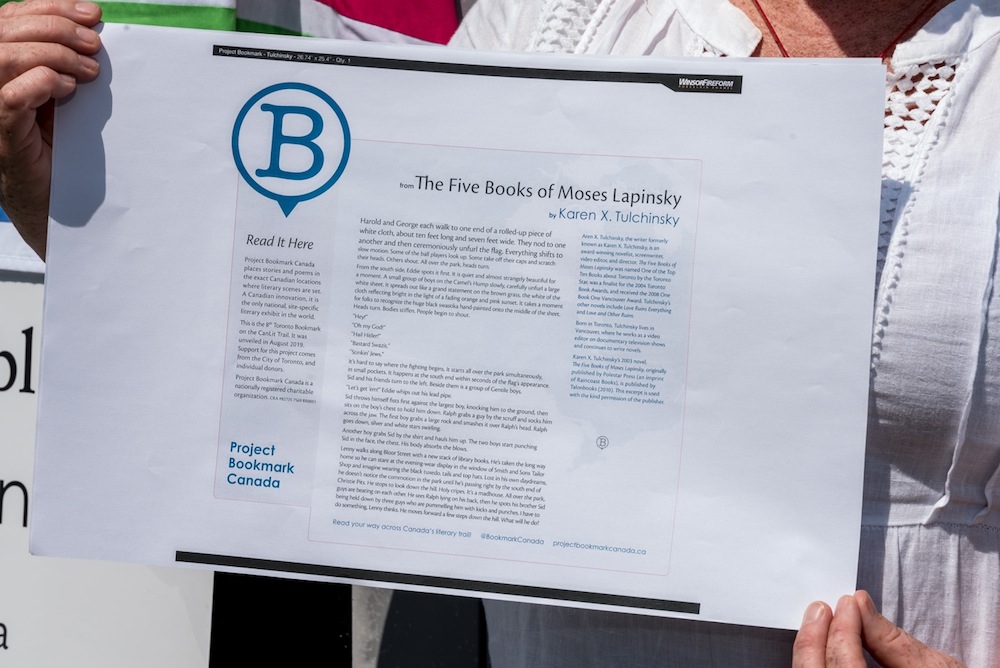Vancouver writer Aren X. Tulchinsky at the Aug. 16 unveiling in Toronto of Project Bookmark Canada’s plaque honouring his novel, The Five Books of Moses Lapinsky. (photo by Lisa Sakulensky)
The Canadian Literary Trail has a new bookmark – one honouring The Five Books of Moses Lapinsky by Vancouver writer Aren X. Tulchinsky. The 25th such plaque to be erected by Project Bookmark Canada across the country, the unveiling took place Aug. 16 in Dominico Field at Barton Avenue and Christie Street in Toronto. Tulchinsky took part in the ceremony.
“Last October, I received a phone call from Laurie Murphy, executive director of Project Bookmark Canada, letting me know my historical novel The Five Books of Moses Lapinsky was nominated for a bookmark,” Tulchinsky told the Independent. They chose to unveil the plaque on Aug. 16 because it is the day on which the 1933 riot in Christie Pits took place.
Surprised and thrilled to hear that Project Bookmark Canada and the City of Toronto would be erecting the plaque in honour of his book, Tulchinsky said, “I was particularly struck by the timing, when, right now, we are all being called upon to make sure that dark chapters of our history do not repeat themselves.”
He explained, “My novel is about a fictional Jewish Russian immigrant family, living in the Kensington Market neighbourhood in the 1930s and ’40s. The main character, Sonny Lapinsky, is a Jewish boxer. He is 9-years-old … when the riot in Christie Pits occurs and, on that night, he discovers he has boxing talent and goes on to become a professional boxer. That same night, tragedy strikes the Lapinsky family.
“Many Canadians are not familiar with the 1933 riot, which involved 15,000 people and is the largest race riot ever to occur in Canada. A group of British- and German-Canadian young men, members of the Swastika Club, set off the riot when they unfurled a huge, black and white swastika flag in Christie Pits during a packed amateur league baseball game on a hot August night. The Project Bookmark plaque in Christie Pits will bring greater awareness to this piece of Canadian history and, of course, to my novel.”
Project Bookmark Canada was founded by writer Miranda Hill in 2007, with the first plaque being unveiled in 2009 – for Michael Ondaatje’s In the Skin of a Lion, at the Bloor Street Viaduct in Toronto. There are bookmarks from British Columbia to Newfoundland. Vancouverites have easy access to Bookmark No. 12, which commemorates Wayson Coy’s The Jade Peony, at the southeast corner of Pender Street and Gore Avenue in Chinatown.
“Visitors are encouraged to read their way across Canada, online and in person,” said Project Bookmark board of directors president Hughena Matheson in the press release about Tulchinsky’s honour. “A launching place for conversation, collaboration and learning, the bookmarks provide a unique reading experience and a deeper understanding of the country and its people.”
“I think Project Bookmark Canada is an important organization,” said Tulchinsky. “Their goal is to get people to read Canadian books. It is vital to celebrate our unique Canadian history and, sadly, our country is constantly in the shadow of the U.S., with American books filling our bookshelves. With the loss of small independent bookstores across the country who used to promote Canadian authors, and with people buying books online from huge American corporations, many excellent Canadian books go unnoticed. As a Canadian and as a writer, I applaud the work Project Bookmark Canada is doing to bring Canadian stories to the forefront.”

At the Aug. 16 unveiling, Tulchinsky read the excerpt of his novel – published under the name Karen X. Tulchinsky – that appears on the plaque. “It is the moment when, in 1933, the Swastika Club unfurled a huge swastika flag at the ninth inning of an amateur league baseball game in the park. All summer, the Swastika Club had been bullying Jews on the beaches of Toronto. On this day, they upped the ante and brought their antisemitism to the west side of town, which was mostly Jewish and Italian immigrants. After a summer of being kicked off the beaches, young Jewish men fought back. And, interestingly, the Italian men in the park joined the Jews in fighting against the Swastika Club and their allies, in what became the largest race riot ever to occur on Canadian soil.”
“Our past president, Don Oravec, spoke at the unveiling and said the novel was on his radar as a potential bookmark,” Project Bookmark’s Murphy told the Independent of how The Five Books of Moses Lapinsky was selected. “When Daniel Gelfant made an official submission to us to consider the book and its variety of Toronto settings as potential bookmarks, the wheels were set in motion. The board’s national bookmark advisory committee reviewed the proposal and approved it for development. Councilor Joe Cressy made a motion to the City of Toronto to provide funding in support of a bookmark for the Christie Pits ball field, on the anniversary of the riots in 1933. It was approved, and subsequently developed. Additional funds were raised by individual donors attending a bookmark fundraiser on Aug. 15, complete with a boxing demonstration by the author and the Toronto Newsgirls Boxing Club at Jazz Bistro.”
When he first started writing the novel, Tulchinsky, who was born in Toronto, said it “was loosely based on stories my grandfather had told me about his escape from Russia before the Second World War and his early days in Toronto, where his first home in Canada was in the Kensington Market area.
“When I started researching the Jewish community in 1930s Toronto, I discovered the riot that pitted young Jewish men and their Italian allies against the Swastika Club and their gentile allies…. As a Canadian Jew, I knew immediately that I would tell my story against this backdrop, an important piece of our history that had not yet been told in fiction. So, I created a fictional family, with four sons, all of whom get involved in the riot in different ways. On the night of the riots, one of the brothers is permanently injured in a way that shatters the family, especially the main character, Sonny, whose guilt over what happened to his brother causes a rift between him and his father, that sends the family into turmoil.
“The Five Books of Moses Lapinsky, which takes place … when Hitler first came to power in Germany, and continues through the Second World War years, is about antisemitism in Canada,” he said. “It’s about how hatred only leads to more hatred and violence. At the risk of sounding like the Vancouverite I am, I believe the only cure for hate is love. Sadly, history tends to repeat itself and, today, in 2019, we are seeing a rise in hate crimes in Europe, the U.S. and here in Canada against Jews, Muslims, South American migrants and the LGBTQ community. We are witnessing the president of the United States taking children away from their asylum-seeking parents and imprisoning them in what can only be called concentration camps. The themes in my novel, sadly, are just as relevant today as ever. I hope people see the parallels in the fascism that swept the world in the 1930s with what is happening today. I just keep hoping that humans will find a better way forward that does not repeat the mistakes of our past.”
And Tulchinsky continues to examine that past.
“I am currently working on a new novel, set in 1930s Berlin, in which I follow fictional characters (Jewish and non-Jewish) as Hitler first comes to power. In the story,” he said, “we watch as the Jewish characters are systematically stripped of their civil rights, then their livelihoods and, eventually, their lives. For my research, I have read hundreds of books on the Holocaust and the rise of the Nazis in the 1930s and I can tell you there are many policies the Trump administration is pursuing in the U.S. that are taken directly from Hitler’s playbook. In the current climate, with antisemitism, racism and homophobia on the rise, I feel particularly driven to finish and publish this new novel.”
To find out more about the Canadian Literary Trail, visit projectbookmarkcanada.ca.

